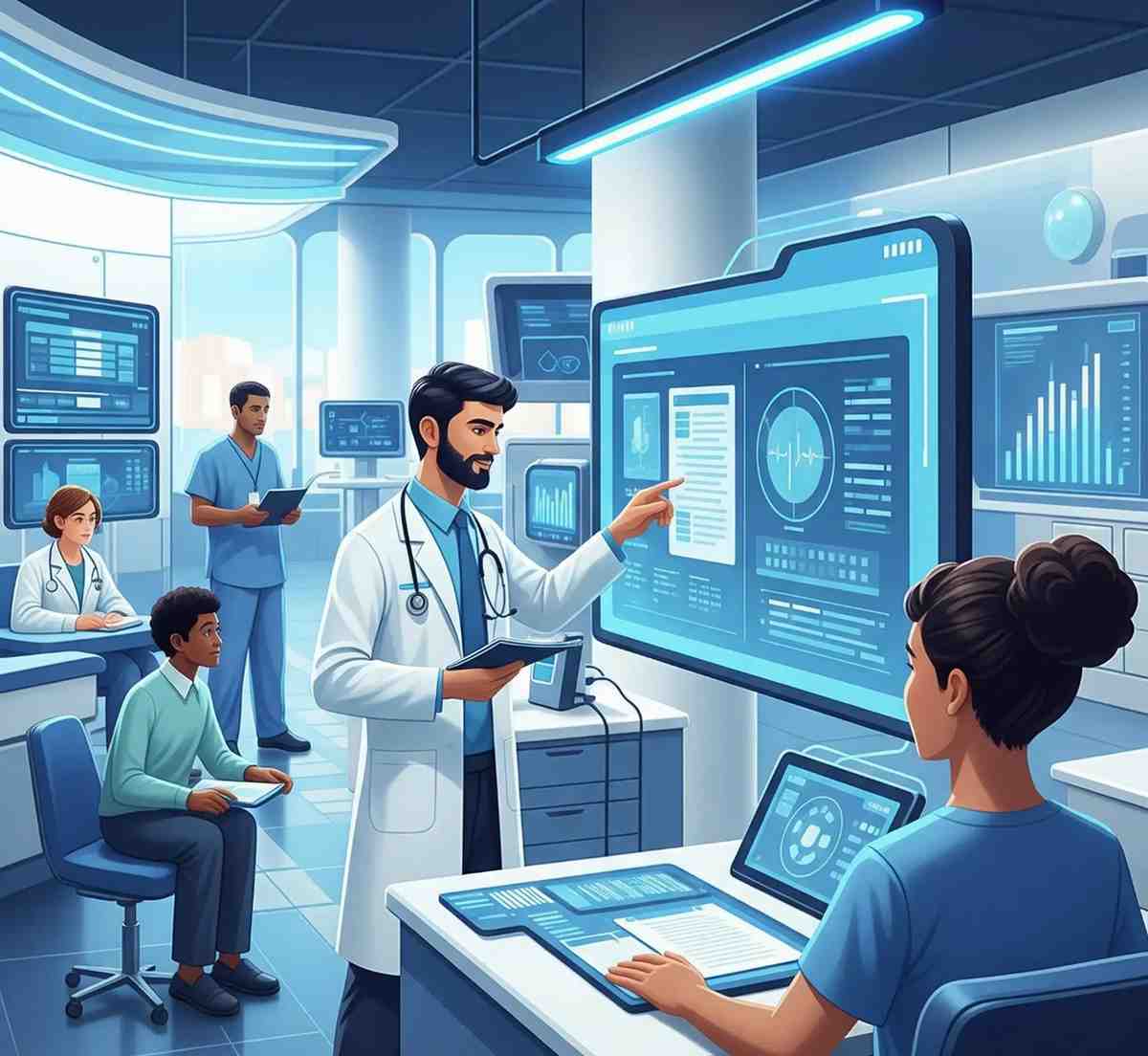
In today’s world of healthcare, speed and precision are everything. Patients expect more, doctors work under immense pressure, and hospital management juggles complex operations daily. Amid all this, relying on piles of paper records feels like running a marathon in heavy boots—it slows everything down. That’s precisely why hospitals worldwide are embracing Electronic Medical Records (EMR) and Electronic Health Records (EHR) systems.
These aren’t just digital replacements for filing cabinets. They’re intelligent systems that empower doctors, enhance patient care, reduce operational costs, and bring hospitals closer to the future of smart healthcare. For decision-makers, switching to EMR/EHR is no longer a matter of if—it’s a matter of when.
Let’s break down why adopting EMR/EHR is a turning point for hospitals.
Enhanced Patient Care
At the heart of every hospital lies its commitment to patient care. EMR/EHR systems bring all patient information—history, lab results, allergies, prescriptions—into a single, accessible dashboard.
Instead of shuffling through files, doctors get a 360-degree view of patient health in seconds, enabling them to make faster, more informed decisions. This translates into:
- Fewer medical errors due to clear, legible digital prescriptions.
- Faster diagnosis with efficient lab result integration.
- Personalized care plans driven by accurate data.
When care becomes faster and more precise, patient trust and satisfaction grow—strengthening a hospital’s reputation.
Improved Operational Efficiency
Efficiency often makes the difference between a hospital that merely functions and a hospital that thrives. EMR/EHR eliminates outdated paperwork, reduces duplication, and automates administrative bottlenecks.
Key areas where efficiency skyrockets:
- Scheduling & Appointments: Digital systems reduce no-shows with reminders and make re-scheduling seamless.
- Billing & Insurance: Integrated coding and e-claim systems minimize billing errors and accelerate claim approvals.
- Data Sharing: Patient info can be shared across departments instantly, reducing waiting times and delays.
For hospital leaders, this translates into better staff productivity, reduced operational waste, and improved margins.

Stronger Data Security
Patient data is as sensitive as it gets. Paper files risk being misplaced, tampered with, or destroyed. EMR/EHR brings in a layered security umbrella with encryption, role-based access, and automated backups.
Compliance with healthcare regulations such as HIPAA (in the US) or NABH/NABL standards (in India) becomes far more manageable when patient information sits inside a secure, auditable system. The confidence of patients knowing their data is in safe hands adds another layer of credibility to the institution.
Better Collaboration Across Teams
Hospitals are complex ecosystems where doctors, nurses, and diagnostic teams must stay on the same page. EMR/EHR bridges gaps in collaboration by centralizing records.
- Specialists can see the same files simultaneously without duplication.
- Nurses get automated task updates for medication schedules.
- Surgeons can instantly receive pre-op instructions and lab reports.
Collaboration adds speed and transparency to clinical workflows. This synchronized approach not only improves outcomes but also prevents costly miscommunications.
Enhanced Analytics and Insights
What’s the biggest untapped goldmine in hospitals today? Data. And EMR/EHR systems convert scattered records into actionable insights.
Hospitals can analyze trends like:
- Which treatments deliver the best outcomes.
- Common causes of readmission.
- Seasonal spikes in certain diseases.
This isn’t just reporting—it’s predictive care. With data-driven intelligence, hospitals can allocate resources smartly, optimize staffing, and even anticipate patient needs before they escalate into emergencies.

Cost Savings Over the Long Run
While some hospitals hesitate due to initial implementation costs, EMR/EHR proves a long-term money-saver. Reduced administrative labor, fewer redundant tests, more efficient billing, and better inventory control result in tangible savings year after year.
The financial benefits go beyond savings: hospitals see a healthier revenue cycle thanks to quicker insurance settlements and improved patient flow. In short—investing in EMR/EHR is like building a financial moat for your hospital.
Patient Engagement and Empowerment
Today’s patients are digitally connected. They want easy access to their health information, test results, and prescriptions. EMR/EHR systems come with patient portals and mobile apps that let patients:
- Schedule appointments online.
- Access prescriptions and reports instantly.
- Communicate securely with their doctors.
This increased engagement not only empowers patients but also reduces incoming calls and unnecessary visits, lightening the load for hospital staff.

Key Benefits at a Glance
Here’s a quick snapshot of what EMR/EHR brings to the table:
| Benefit | Impact on Hospitals | Impact on Patients |
|---|---|---|
| Enhanced Patient Care | Quicker decisions, reduced errors | Personalized and safer care |
| Operational Efficiency | Streamlined workflow, cost savings | Faster services, shorter waits |
| Data Security | Regulatory compliance, reduced risk | Trust in data privacy |
| Team Collaboration | Better coordination between staff | More accurate and timely care |
| Analytics & Insights | Smarter planning and forecasting | Improved outcomes |
| Patient Engagement | Reduced staff workload | Empowered and informed patients |
Stepping into Smarter Healthcare
Hospitals that adopt EMR/EHR aren’t just digitizing records—they’re future-proofing healthcare delivery. From sharper clinical decisions to operational excellence and stronger patient relationships, the benefits ripple across every touchpoint.
For hospital decision-makers, this is not merely a technology upgrade; it’s a strategic leap that positions your hospital as a leader in patient-centric care.
If your hospital hasn’t taken the digital leap yet, the time is now. The question is simple: Do you want to stay reactive with old systems, or become a proactive hospital that’s ready for the future of healthcare?
This is where SmartHMS and its tailored EMR/EHR solutions make all the difference. Designed for hospitals that prioritize efficiency, security, and patient trust, SmartHMS offers easy integration, intuitive interfaces, and robust support—ensuring your transition to digital healthcare is smooth and impactful.
Ready to transform your hospital’s future?
Book a free demo or talk to our experts at SmartHMS today, and see how our EMR/EHR Solutions can help your hospital stay ahead, deliver outstanding care, and build lasting patient loyalty.
